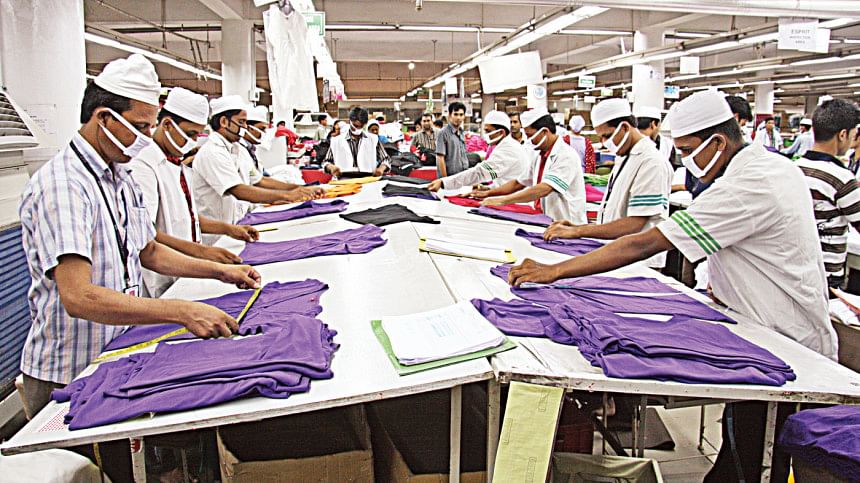Why RMG exporters chose Maldives shipping route

Bypassing the traditional air shipment routes through India or Bangladesh, garment exporters have found the Maldives to be a cheaper as well as faster route.
Exporters said air freight through the island nation of the Indian Ocean, about 2,800km away from Dhaka, saved them almost up to a dollar per kilogram of shipment to European countries.
They said the traditional shipment routes through Dhaka, Kolkata, Colombo or Singapore had either become too expensive or too slow.
The India-based business news outlet Mint reported that Bangladesh, the world's second-largest garment producer, has opted to bypass India and ship its textiles to global markets through the Maldives, hurting the cargo revenue prospects of India's airports and ports amid strained bilateral ties.
The RMG industry was facing a substantial backlog in the wake of the student protests in July and August when everything had ground to a halt. Shipment rates through Dhaka had climbed to $6.30–$6.50 per kg, which has now come down to $3.80–$4.10 per kg for shipping to Europe.
This is when Bangladeshi exporters stumbled upon the new route through the Maldives. Kabir Ahmed, president of Bangladesh Freight Forwarders Association (BAFFA) said, the Maldives airport route emerged almost organically as the cost of shipment was too high through other routes.
There was a sudden surge of shipment demand as factories resumed production after the restoration of order as the interim government took over in the second week of August. The demand for dry cargo shipment almost doubled to 800–900 tonnes at Dhaka airport from the usual 400–450 tonnes per day.
The exporters could not ship goods via the maritime route using Chattogram either because the student movement in July and August had halted operations at the port as well as much of the country. The consequent backlog also had to be cleared quickly once operations resumed as exporters became desperate to meet their looming deadlines, many of which had presumably been extended considering the political situation.
Dhaka's Hazrat Shahjalal International Airport is expensive for exporters because of its high operational costs, levies and operational hazards. The Dhaka airport also suffers from a dearth of necessary equipment like scanning machines and explosive detection systems (EDS). Furthermore, there are not enough airlines connecting to Dhaka to fly the goods out.
In contrast, local exporters say shipment through the Maldives is faster and costs only $3–$3.50 per kg.
Besides the few airlines — US Bangla, Maldivian airlines, Sri Lankan airlines — connecting Dhaka with Male, exporters also send their cargo on feeder vessels via Colombo, explained Kabir Ahmed. The cargo is then put on air freight from Male to European destinations.
Ahmed explained over phone that Kolkata and other airports in India typically prioritised their own cargo over Bangladeshi goods when shipping to Europe. Moreover, many more airlines connect with Male than with Dhaka, he added.
To make matters worse, a number of international airlines have curtailed operations in Dhaka because of Bangladesh's foreign currency crunch which meant that they could not repatriate profits. That problem has been alleviated to a large extent of late due to central bank intervention, he said.
Ahmed explained that while Bangladesh has a very good relationship with India, shipping goods via Kolkata airport or any other Indian airports by overland shipment through Benapole is costly for exporters. The Maldives offers a cheaper alternative, he said.
The demand for air shipment from Asian countries including Bangladesh has been rising also because of the prevailing crisis in the Red Sea—the main conduit between Asia and Europe—with its Houthi attacks.
Ever since the Iran-backed Houthis started attacking commercial vessels in retaliation to Israeli attack on Palestinians, cargo ships have had to sail an extra 4,000 kilometres around Africa's Cape of Good Hope to reach Europe, which is both expensive and time consuming.
Faruque Hassan, former president of Bangladesh Garment Manufacturers and Exporters Association (BGMEA), the top RMG exporters' platform, said the number of cargo planes from Dhaka airport is really low as international airliners curtailed operations here. "At the same time, it is expensive and services are poor."
Moreover, while the volume of dry air cargo, like garments, has increased manifold over the years, capacity of the airlines has in fact decreased, he said.
He said exporters were facing a lot of pressure for shipment from Colombo, Singapore, Malaysia and other Indian ports so the Maldives is a preferable alternative.

 For all latest news, follow The Daily Star's Google News channel.
For all latest news, follow The Daily Star's Google News channel. 









Comments